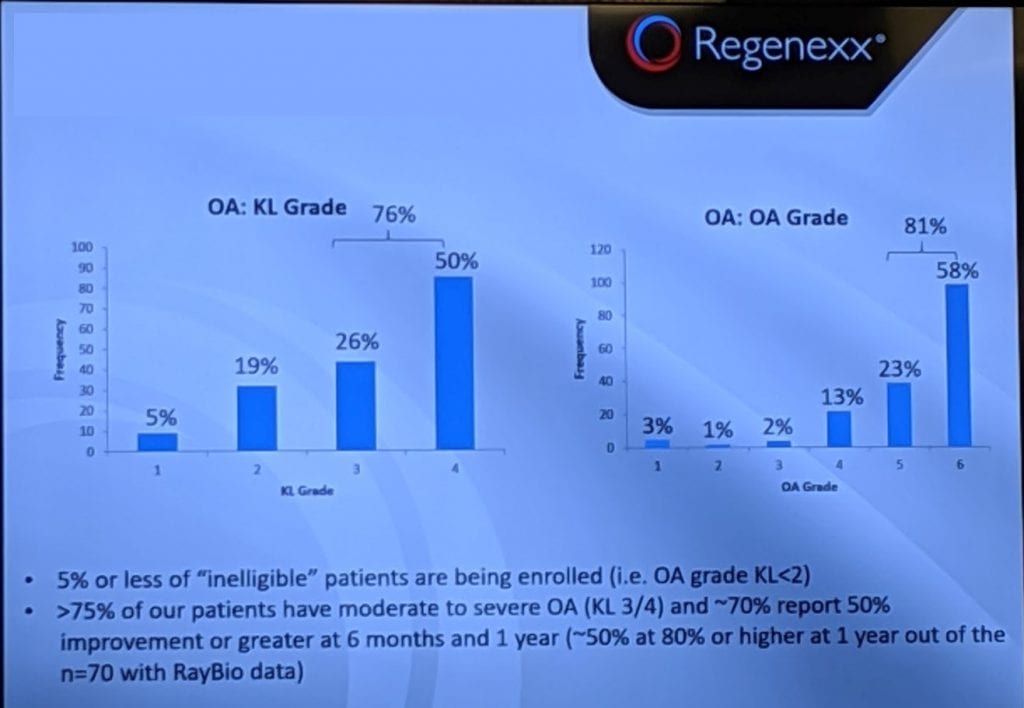Does Knee Arthritis Severity Impact Stem Cell Treatment Outcome?
For so many therapies used to treat knee arthritis, the best way to determine if a specific therapy will help is the severity of the disease. Meaning that less severe knee arthritis responds better than the more severe forms of the disease. However, one of the things we’ve observed about our same day bone marrow based stem cell therapy is that this rule goes out the window. This morning we’ll review this by going over some data from our research meeting yesterday.
Knee OA Severity and Other Treatments
Pretty much every treatment for knee OA (osteoarthritis) follows the rule that if the arthritis is more severe, the treatment will be less effective or last less time. This is true for steroid shots and hyaluronic acid gel injections. Surgeries like microfracture or other cartilage repair technologies generally follow this same rule. Even PRP is the same, as while it can last a year or two in mild arthritis knees, it only lasts weeks to months when used in a patient with severe arthritis.
Our Past Findings on Severity and the Regenexx-SD Procedure
We’ve been studying the Regenexx-SD (same day bone marrow based stem cell procedure) for 14 years. Way back when, as we got enough registry data, it became clear that patients who had the procedure with severe knee arthritis were doing as well as those with mild arthritis. We published on this phenomenon in a large case series and eventually published a randomized controlled trial on the knee OA procedure.
On the other hand, if you have more severe hip arthritis, that does impact the outcome of the Regenexx-SD procedure. In those cases, the improvement declines with increased severity. That’s consistent not only in our data but also in that reported by others.
A Nice Image from Our Science Meeting
At Regenexx, I constantly meet with our science team to go everything from new research to be published to existing clinical or lab studies, to process improvement on existing procedures. Every two weeks we have a science team meeting with the whole group where everyone presents the results of what they’re working on. In yesterday’s meeting, our CSO Neven Steinmetz, Ph.D. put up this slide:

This was actually an audit on one of the many clinical trials we’re involved in that thankfully demonstrated that very few mild knee arthritis patients were entering into this observational research. The study looks at the chemical makeup of the synovial fluid in moderate to severe knee OA patients, so only having 3-5% mild knee OA patients in that study is a good thing. However, what was interesting is that in this 170 patients who had knee MRIs read by our physicians and the results recorded, between 76-81% (depending on which OA grading scale you use) were moderate to severe knee arthritis patients. Despite being knee replacement candidates, these patients still did very well with the procedure. For example, 70% report more than 50% improvement at 6 months and a year out from the procedure. This is consistent with the data we have collected that shows that the severity of knee OA just doesn’t matter when it comes to our Regenexx-SD procedure.
The upshot? At Regenexx, we have a huge commitment to ongoing research. In this case, we have looked at the issue of knee arthritis severity and whether this makes someone a poor candidate for the procedures we offer. For PRP that does matter as it does for hips even when we use the bone marrow therapy, but for the same day stem cell procedure, our data continues to demonstrate that it doesn’t matter. That’s a good thing if you happen to have severe knee arthritis!

If you have questions or comments about this blog post, please email us at [email protected]
NOTE: This blog post provides general information to help the reader better understand regenerative medicine, musculoskeletal health, and related subjects. All content provided in this blog, website, or any linked materials, including text, graphics, images, patient profiles, outcomes, and information, are not intended and should not be considered or used as a substitute for medical advice, diagnosis, or treatment. Please always consult with a professional and certified healthcare provider to discuss if a treatment is right for you.